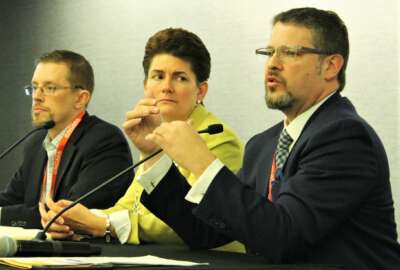

CenturyLink, Verizon and Granite Telecommunications submitted protests to the Government Accountability Office over task orders under the Enterprise Infrastruct...
The General Services Administration’s Enterprise Infrastructure Solutions (EIS) program didn’t get the flood of solicitations many expected by March 31, but it did get hit with a deluge of protests.
Awards by the departments of Commerce and Veterans Affairs, and the solicitation to support the Air Force Air Education and Training Command are all facing complaints before the Government Accountability Office.
“Vendors spent lot of time and money to get on EIS and have been patiently waiting for the task orders to come out,” said Gary Wall, CEO of Coastal Communications Consulting Group and a former telecommunications branch chief for the Department of Health and Human Services. “I think vendors are looking for their return on investment, especially the newcomers, so when agencies put out these large, winner-take-all solicitations, you have one winner versus multiple winners, and the losing bidders will scrutinize these awards and think they have been disadvantaged in some way.”
The two protests of the VA award to MetTel, which was for $127.3 million to provide voice services, both claim the unsuccessful bidders were wronged.
Granite Telecommunications and CenturyLink filed separate protests on March 9, claiming if VA had evaluated bids properly someone else other than MetTel would’ve won. GAO has until June 17 to decide.
CenturyLink also submitted a protest on April 8 of Commerce’s multiple awards to Verizon and AT&T.
Commerce divided its EIS task orders into six task areas. CenturyLink says awards were made to Verizon under task 1, which is valued at $243.8 million, and to AT&T for tasks three and five, valued at $59.9 million and $14.8 million, respectively.
It’s unclear what each of the tasks cover or which vendor, if any yet, won tasks areas two, four and six.
Bob Woods, president of Topside Consulting and a long-time government telecommunications expert, said Commerce seems to be trying to create an indefinite delivery, indefinite quantity (IDIQ) contact under EIS, which already is an IDIQ contract. Woods said acquisition regulations do not allow for that.
“In a lot of these protests, the losing bidders are desperate to get into the discover process to find out more about why they lost,” Woods said. “I think they figure let’s file a protest and see what happens.”
The Verizon protest is a bit different than the other three. The company lodged a pre-award complaint with GAO over the Defense Information Technology Contracting Organization solicitation to buy internet protocol service, access arrangement, internet protocol voice service, managed service, and managed network service for the Air Force’s Air Education and Training Command, Air Force Recruiting Service.
A Verizon spokesperson said DITCO’s use of lowest price technically acceptable (LPTA) is at the center of the complaint.
“We protested because the 2017, 2018, and 2019 Defense authorization bills make clear that federal agencies, including DoD, should avoid using LPTA procedures to the maximum extent practicable when buying information technology or telecommunications services,” the spokeswoman said. “In this case, the Air Force is trying to buy these exact services in the EIS task order, using LPTA procedures. We recommend that the Air Force use a best value tradeoff instead.”
Mike Maiorana, the senior vice president of public sector sales, federal for Verizon, said in a statement that the use of best value ensures bids are fairly evaluated.
“The networks and technologies that our federal partners utilize are critical to enabling their important missions. Those missions are too important to the American people to simply buy for the lowest price,” he said.
Verizon submitted its protest on April 3 and GAO has until July 13 to decide.
Coastal Communication’s Wall said, generally speaking, agencies too often are taking a winner-take-all approach to the solicitations and that’s causing non-incumbents to protest.
“It is easy to understand why these winner-take-all RFPs give considerable advantage to the incumbent. Unless the agency clearly articulates numbers and requirements for equipment replacement schedules to the degree a non-incumbent could understand, it further enhances the incumbent’s position,” he said. “I think there are a couple of drivers here. I think the deadlines are driving agencies to do certain things and it wouldn’t be out of realm of possibility that they go with the path of least resistance.”
Wall said the frustrations among EIS vendors over the winner-take-all approach by many agencies are growing despite GSA and Congressional direction against it.
In the initial report of the Financial Services and General Government fiscal 2020 appropriations bill, lawmakers called for agencies not to take the winner-take-all approach.
“The committee is aware that EIS is structured to maximize competition by providing federal agencies with the opportunity to receive best value by logically grouping together relevant services in multiple fair opportunity task orders as opposed to limiting competition by awarding unrelated services to a single service provider that provides the broadest array of products and services,” the report stated. “To ensure a timely and efficient transition to EIS, the committee directs GSA to instruct each agency to adopt an updated transition management plan and an integrated transition time line, as recommend by GAO.”
Wall said GSA tried to encourage agencies to break out their solicitations with ACT-IAC hosting a May 2018 event where the agency talked about why a more modular approach would be both faster and more cost effective.
Topside’s Woods added too often agencies are looking for something “quick, cheap and easy and they are not getting it. These are complicated. I’m not sure many agencies have the in-house talent to manage these contracts well so it’s harder for them to break it up into pieces.”
During the life of EIS, GovTribe, an industry research firm, says agencies have made 37 awards under EIS with AT&T winning 14 task orders, Verizon winning 10, CenturyLink nine, and MetTel and Granite two each. The average award is worth $136.8 million and on average, agencies receive just under four bids per task order.
Copyright © 2024 Federal News Network. All rights reserved. This website is not intended for users located within the European Economic Area.
Jason Miller is executive editor of Federal News Network and directs news coverage on the people, policy and programs of the federal government.
Follow @jmillerWFED


